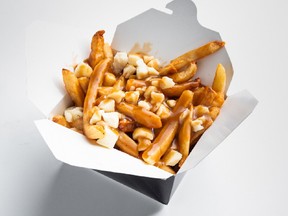Though the dictionary definition is straightforward — 'a dish of French fries covered with brown gravy and cheese curds' — poutine's history is more complicated

Article content
Canada’s unofficial official dish was recognized by the oldest dictionary in the U.S. nine years ago today.
Advertisement 2
Article content
Poutine was added to the Merriam-Webster on May 19, 2014, alongside a number of other food-focused entries, including pho and turducken.
Though the dictionary definition is straightforward — “a dish of French fries covered with brown gravy and cheese curds” — poutine’s history is more complicated, with at least three rural Quebec towns claiming ownership of the dish.
The etymology of the word is also debated. Poutine is Québécois slang for a “mess,” and the namesake is also commonly attributed to the English word “pudding,” or “pouding” in French. The anniversary of the dictionary definition is being celebrated in Canada with today’s Google Doodle.

The dark side of poutine: Canada taking credit for Quebec dish amounts to cultural appropriation, academic says

This Montreal restaurant is Canada's greatest, according to annual list of 100 best
Article content
Advertisement 3
Article content
The cheerful illustration, complete with a dancing and smiling fork, belies the dish’s complicated and contested history.
Per The Canadian Encyclopedia, poutine emerged in rural Quebec snack bars in the 1950s, particularly in the region of Warwick, a small town a couple of hours outside of Montreal in the Centre-du-Québec region.
One of the most famous origin stories centres on Fernand Lachance, who owned Café Ideal. Lachance reportedly began adding locally made curds to orders of fries at the request of a regular customer and the dish eventually made its way onto the menu, though it was tweaked along the way.
Lachance reportedly responded “ça va te faire une maudite poutine!” (“that will make a damned mess!”) at the initial request, but would nonetheless send customers home with fries and curds stuffed in a paper bag. Eventually, Lachance began plating the dish and serving it in the restaurant. After customers noted the fries would grow cold too quickly, Lachance began adding gravy.
Advertisement 4
Article content
Another origin story credits Jean-Paul Roy who operated the drive-in restaurant Le Roy Jucep in Drummondville. Like Lachance, Roy was reportedly influenced by his customers, who would add bags of cheese curds to orders of fries and gravy. Roy followed their lead and introduced the dish to his menu, calling it fromage-patate-sauce.
Poutine, of course, is now found coast to coast to coast, though it can take on some regional specifications, such as in Newfoundland, where the dish veers in the direction of Thanksgiving and features fries topped with dressing, stuffing and gravy.
Poutine has also been added to everything from doughnuts to burritos to pizza. Jones Soda even launched a limited edition poutine-flavoured beverage in Canada in 2013. It is perhaps not surprising then, that some see the importance of protecting poutine’s Québécois heritage.
Advertisement 5
Article content
“Poutine has been used at times to tarnish Quebec culture and undermine its legitimacy of self-determination as a nation,” Nicolas Fabien-Ouellet wrote in his 2016 paper “Poutine Dynamics,” published in Cuizine: The Journal of Canadian Food Cultures.
In a previous interview with the Post, Fabien-Ouellet said his research exposed “how the Canadian culinary identity is constructed and construed by means of cultural appropriation processes.”
The presentation of poutine as a Canadian dish, rather than a Québécois creation, contributes to the “ongoing process of poutine culinary appropriation and the threat of Québécois cultural absorption by Canadians,” argued Fabien-Ouellet, noting that poutine was included on the Canadian State Dinner menu organized by the White House in March 2016.
“The dish should be, ideally, labelled explicitly as a Québécois dish and not a Canadian one to further underscore the cultural context to which it actually belongs,” he wrote.
The White House variation was gussied up to include smoked duck, red wine gravy and cheese curds on a wafer.
“We want our Canadian friends to feel at home,” remarked then-President Barack Obama. “So this is not a dinner, it’s supper.”


Comments
Postmedia is committed to maintaining a lively but civil forum for discussion and encourage all readers to share their views on our articles. Comments may take up to an hour for moderation before appearing on the site. We ask you to keep your comments relevant and respectful. We have enabled email notifications—you will now receive an email if you receive a reply to your comment, there is an update to a comment thread you follow or if a user you follow comments. Visit our Community Guidelines for more information and details on how to adjust your email settings.
Join the Conversation